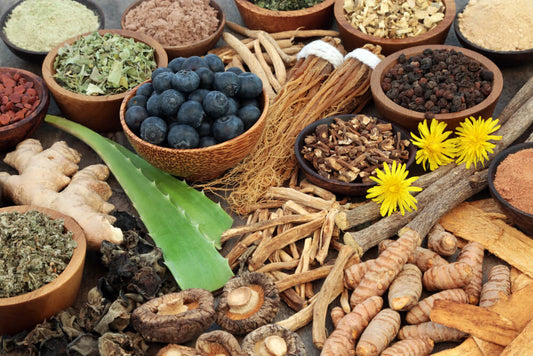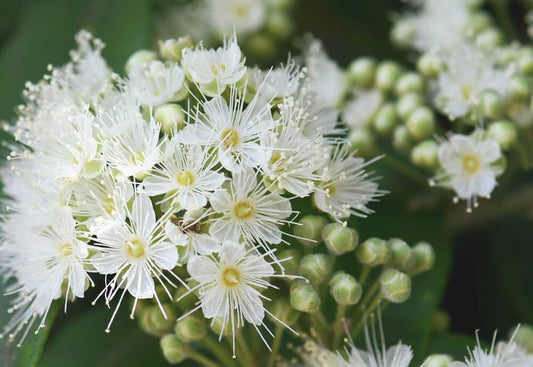
Are adaptogens safe?
A class of herbs that can help combat stress and balance mood? It sounds too good to be true but adaptogen herbs may be one of the best things in nature’s medicine cabinet for modern man. In today’s world, one of the biggest challenges for everyone is stress. From work pressure to screaming toddlers, to traffic jams, a lot of us have to work hard to cope with daily stressors.
It’s no secret that all this stress takes a toll on our bodies, throwing off homeostasis, tossing a sledgehammer to our inner harmony, and leaving our bodies more vulnerable to fatigue, illness, and the development of chronic diseases.
Adaptogen plants have been used as a source of restorative medicine in ancient cultures around the world from the Far East to the Andes for centuries. But what exactly are adaptogens and are they actually safe?
What are adaptogens?
Adaptogens are plants that work by helping the body adapt to stress. These herbs, roots, and fungi get their name from what they do – they help the body adapt. By helping the body cope on the physical level, they act to reduce the negative impact of stress on the body, which in turn can have a host of positive effects such as increasing energy, stabilising mood, and strengthening the immune system.
How do adaptogens work?
It’s not fully known how all adaptogens work. Essentially, they encourage the body to return to homeostasis. Many adaptogens support the adrenal glands, the hypothalamus, and the pituitary gland, which together form what is known as the HPA, or hypothalamic pituitary adrenal, axis. The HPA axis determines how the central nervous system and endocrine system interact.
The adrenals, pituitary gland, and hypothalamus make the hormones that regulate entire body systems – your immune system, metabolism, blood pressure, and even how your body responds to stress. One way to help support the HPA axis – and to help bring the body to a state of balance – is with herbal adaptogens.
Benefits of adaptogens
Studies have shown that adaptogens offer a sweeping range of benefits. Unlike other herbs and superfoods that may offer more localised health benefits, such as peppermint soothing the digestive system or sage for improving brain function, adaptogens appear to support total mind-body wellness because they address the parts of the body that deal intimately with our reactions to stress.
Adaptogens have been shown to:
- Stimulate the central nervous system
- Reduce fatigue
- Fight depression
- Protect the nervous system
- Increase mental work capacity
The overall benefit of supplementing with adaptogens is to help the body perform – both physically and mentally – even during times of stress.
Even though stress-busting herbs are grouped together, each adaptogen will have a unique effect on the body. They all contain varying nutrients and bioactive compounds and may impact the HPA axis, or parts of it, in different ways.
How safe are adaptogens?
As with other natural herbs, adaptogens are considered safe when taken appropriately. They’ve been used to help support the body for centuries and many of today’s herbalists, naturopaths, and practitioners of eastern medicine use various adaptogen herbs.
There are generally no negative side effects of adaptogens as a group but it’s still important to learn about the potential side effects of any herbs you decide to take. Also, for women who are pregnant or breast-feeding, it’s recommended to avoid adaptogens. You can talk to your doctor about taking an adaptogen for adrenal health or for stress reduction to make sure there are no concerns related to any conditions you have or medications you are taking.
List of adaptogens for stress
These are some of the most widely used adaptogens for stress and well-being.
Holy basil
Also known as tulsi, this adaptogen has anti-stress properties that help to promote a sense of relaxation. In the Journal of Ayurveda and Integrative Medicine, it’s reported to have anti-anxiety and antidepressant properties. It’s also been shown in animal studies to increase endurance. It’s native to Southeast Asia and a staple of Ayurvedic medicine but you can find it on your local supermarket’s shelves in the tea section. Holy basil’s spicy flavour makes it delicious in herbal tea blends. You can also grow your own holy basil, check out this helpful guide on how to grow and dry Basil at home.
Reishi mushroom
Reishi is native to Japan and parts of China. From as far back as two millennia, this mushroom was revered for its healing qualities and was only served to the royal and wealthy members of society. Today, it continues to be an important herb in Traditional Chinese Medicine and is used in supplements and health food products throughout the West. High in antioxidants and other nutrients, reishi is known to help support the immune system and protect the body from illness. You can add reishi mushroom powder to your smoothies before flu season to help strengthen your immune system and boost vitality.
Ashwagandha
Ashwagandha has been widely studied for its effects on the body, especially on the nervous system. High in alkaloids and lactones, this herb is a great balancing supplement; it naturally increases its effect when the body needs the energy and softens stimulation when there is too much activity in the body. Research has shown that ashwagandha is particularly helpful for people who suffer from stress and anxiety – it can reduce anxiety and manage the release of cortisol, which in turn can help protect the body from stress fatigue and long-term stress side effects like mental fogginess.
Maca
Maca root has been cultivated in Andean cultures for over 2000 years. It’s known to help balance hormones, support a stable mood, and improve libido. With a slightly sweet, earthy, malty taste, it’s also one of the tastier of the adaptogen herbs. Try adding maca root powder to your favourite breakfast smoothies for an energising early morning beverage.
Rhodiola rosea
Rhodiola is a good adaptogen herb for mild tension and fatigue. It’s been shown in studies to alleviate mental fatigue and increase physical performance. For example, in one study of healthy men and women in their 20s, Rhodiola ‘significantly’ delayed exhaustion after exercise. Another study looked at middle-aged physicians working on the night shift – after two weeks of supplementing with Rhodiola, fatigue scores improved significantly.
Adaptogen supplements and your health
When adding herbal supplements to your diet, it’s always a good idea to talk to a health care professional first. Also, there are a few basic guidelines that can help you enjoy adaptogens safely and get the most out of adding them to your diet.
- Only take one herbal adaptogen at a time. If you start adding different adaptogens to your diet, it’s difficult to notice the distinct differences between how each adaptogen affects your body.
- Don’t combine with medications. A lot of adaptogens, such as reishi mushrooms and ashwagandha can interact with some medications.
- Make sure you’re eating a healthy diet even when supplementing with adaptogens. Natural supplements can help to support your health but they aren’t a substitute for a balanced diet. If you aren’t getting enough vitamins, minerals, and other nutrients from your diet, getting enough sleep, and drinking plenty of fluids, an adaptogen supplement won’t be able to come in and save the day, giving you a miraculous amount of energy and warding off all disease.
- Adaptogens don’t work overnight. Usually, it takes at least a few days, if not a week or more, to experience the stress-reducing benefits of adaptogen supplements.
- Only buy adaptogen supplements and herbal teas from trusted suppliers who offer high-quality, organic products.
Adaptogens are safe as long as you follow general precautions for taking any type of supplement. They also offer some of the most useful benefits for coping with our modern, busy, stressful lives – and are revered the world over more than any other type of herb. From holy basil – also known as ‘liquid yoga’ – to reishi mushrooms– the ‘mushroom of immortality’ – there’s a whole world of potential to explore with adaptogens.













